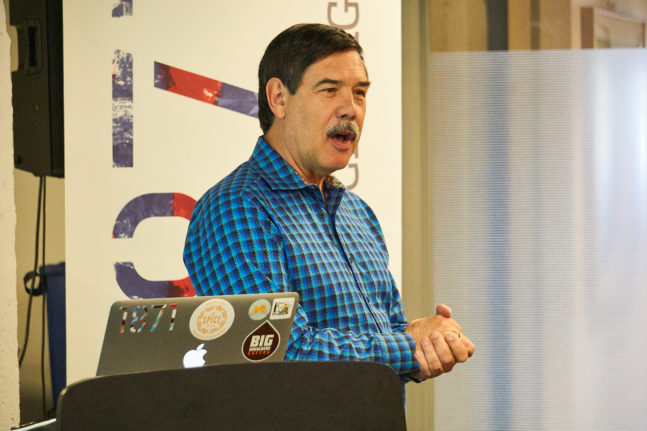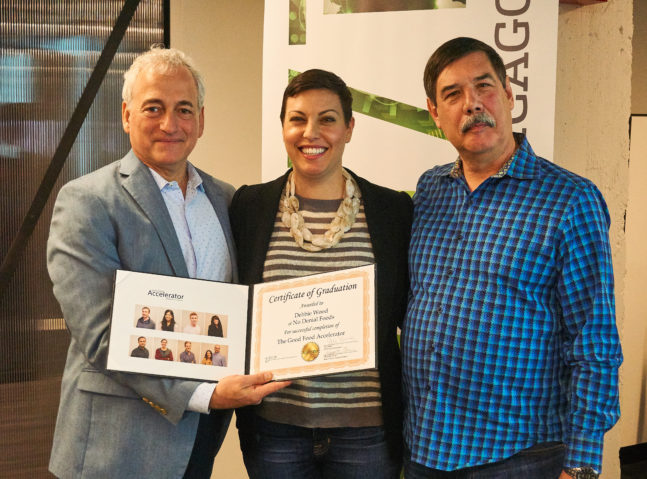by Bob Benenson, FamilyFarmed
Michael Bashaw of Whole Foods Market knows all about change. During more than two decades with the company — rising from meat cutter to Midwest regional president, a position he has held since 2009 — Bashaw was part of Whole Foods’ development into the nation’s biggest natural and organic food supermarket chain. And for nearly a year, he has been managing change as Whole Foods adjusts to Amazon‘s purchase and takeover of the company.
So Bashaw chose change as the subject of his talk at the recent graduation ceremony for the fourth cohort of FamilyFarmed’s Good Food Accelerator program — which from its beginnings in 2014 has enjoyed the partnership of the Whole Foods company and the mentorship of Bashaw.
Bashaw opened by congratulating the eight businesses that completed the intensive six-month program (read more about them in Good Food On Every Table’s article about the graduation). “Everyone has their heroes in business, and my heroes always are the entrepreneurs,” Bashaw said, adding, “I feel that passion in the people we have enrolled here year after year, and the results of that are fantastic. So I thank you for your courage, you are the people who are changing the world a little bit at a time.”

Michael Bashaw, the president of Whole Foods Market’s Midwest region and a longtime friend of FamilyFarmed, addressed the graduation ceremony for the eight businesses in the Good Food Accelerator’s fourth cohort. Bashaw focused his talk on the opportunities and challenges for entrepreneurs resulting from societal and technological changes affecting the food retail sector. Photo: Bob Benenson/FamilyFarmed
He then elaborated on the societal and technological changes affecting food retailing that provide challenges — but also opportunities — for these early-stage companies. One of these changes is the growing consumer demand for convenience, which in turn is fueling the upsurge in grocery delivery services.
Noting that he and Whole Foods recently committed to a new store in downtown Chicago that will open in 2022, Bashaw revealed that the company expects that by the time it opens in about four years, 25 percent of the business in that store will be delivery.
Right up to this current day, new food businesses that get on the shelves at Whole Foods can count on the vast majority of customers having a chance to see their products, and the producers may have opportunities to hold tasting demonstrations. “In that transformed world,” Bashaw said, “maybe 25 percent of our customers may never come in our door. Steady, loyal shoppers spending money, and we may never have the chance to meet them.”
These changes are immutable, Bashaw said: “People’s lives are busier and busier. Whatever we can do that makes that better for them, that makes their meal preparations easier, more convenient, and that people can still feel good about what they’re eating, that’s what’s going to succeed in the future.” There will be losers, businesses they are unable to adapt to this new retail environment. But according to Bashaw, “The people who are able to figure that out will [succeed].”

Michael Bashaw (right), Whole Foods Market’s regional president, participated in the graduation ceremony for the fourth cohort of the Good Food Accelerator, with FamilyFarmed CEO Jim Slama and all the graduating entrepreneurs, including Debbie Wood of No Denial Foods. Photo: Bob Benenson/FamilyFarmed
And early-stage businesses run by younger entrepreneurs, who tend to be attuned to our wired world, can use technology platforms to educate consumers about their products, perhaps much better than they can in the brick-and-mortar stores.
“People really care about where their food comes from, what the ingredients are, what the story is,” Bashaw said. “The truth is that in that technology realm, your can share a lot more information about your product than you’ll be able to get by someone just passing by what’s on the shelf… Plus the ability to have your story shared on social media with other people. In the past, people would do that by word of mouth, and now there will be a bigger opportunity to share that on social media.”
Getting on the shelves of Whole Foods stores is a goal for many Good Food entrepreneurs. Many have been helped in doing just that by FamilyFarmed and its entrepreneur development programs, such as the Good Food Accelerator and the annual Good Food Financing & Innovation Conference, which is coming up on Tuesday, June 19 at Chicago’s Morgan Manufacturing events space. (Read more about the Conference on Good Food On Every Table and on the Conference website, where tickets may be purchased.)
Bashaw addressed concerns that the Amazon takeover of Whole Foods might diminish the chain’s interest in new products, such as those produced by this new crop of Accelerator grads. “What’s not changing is the company’s commitment to small business and to local,” Bashaw assured. “We still are deeply committed to that. That isn’t going to change a bit.”
